COVID-19 restrictions list: What they are and what they mean moving forward

Posted January 13, 2021 12:04 pm.
Last Updated January 13, 2021 11:27 pm.
The Ford government unveiled its latest round of COVID-19 restrictions on Tuesday, declaring a state of emergency and introducing stay-at-home orders for residents on the heels of new modelling and data.
Starting on Thursday at 12:01 a.m., a bevy of new measures will take effect which could lead to some confusion as to what exactly this means for the province moving forward.
For starters, the enhanced public health and workplace safety measures are in place for all of Ontario until at least February 11.
RELATED: Ontario stay-at-home COVID-19 FAQ: clarifying the confusion
Stay at Home Order
People will be required to stay home at all times unless they need to leave the house for any of the following reasons.
Work, school, child-care
- Working or volunteering where the work requires the individual to leave their residence. This includes when an employer requests attendance at a workplace.
- Attending school or classes at a post-secondary institution
- Attending, obtaining or providing child-care.
- Receiving or providing training or education.
Obtaining goods and services
- Obtaining food, beverages or personal care items
- Obtaining items that are necessary for health and safety. This includes any health care services or medications.
- Obtaining or providing goods and services that are necessary for the safety, maintenance and sanitation of households, businesses and transportation.
- Purchasing or picking up goods from a business permitted to provide curbside pickup as per provincial guidelines.
- Attending an appointment at a place that is permitted to be open for appointments as per provincial guidelines.
- Obtaining services from a financial institution.
- Obtaining government services, social services and mental health or addiction support.
Assisting others
- Delivering goods or providing care for someone who requires assistance and support. This includes providing care for someone in a congregate care setting and accompanying an individual for any other purpose permitted in the order.
- Taking a child to their parent or guardian.
- Taking a household member to any place they are permitted to go per the order and provincial guidelines.
Health, safety, legal purposes
- Anything that is necessary to avoid imminent risk of health or safety. This includes protecting themselves or others from domestic violence, leaving or helping someone leave unsafe conditions and seeking emergency help.
- Exercise. This includes walking or moving around with mobility devices and using any outdoor recreational amenities that are permitted to be open.
- Attending a place required by law in relation to the justice system.
- Exercising an Aboriginal or treaty right.
Multiple residences, moving
- Travelling to another residence for less than 24 hours if the reason for attending is for one of the purposes in the order, or travelling to a residence if you intend to reside their for a minimum of 14 days.
- Making arrangements to buy or sell a residence or begin or end a rental lease.
- Moving residences.
Travel
- Travelling to an airport, bus station or train station for the purpose of travelling outside of the province.
Gatherings
- Attending or arranging a wedding, funeral or religious service that is permitted under provincial orders.
- Gathering with members of a single household if you live alone.
Animals
- Obtaining goods or services that are necessary for the health and safety of an animal.
- Obtaining animal food or supplies.
- Anything that is necessary to avoid imminent risk to the health or safety of an animal.
- Walking or exercising an animal.
Organized Public Events and Social Gatherings
- No indoor organized public events and social gatherings, except with members of the same household (the people you live with).
- Individuals who live alone and single parents may consider having exclusive, close contact with another household to help reduce the negative impacts of social isolation.
- Limit for outdoor organized public events and social gatherings must comply with requirements on physical distancing and face coverings: 5 people outdoors.
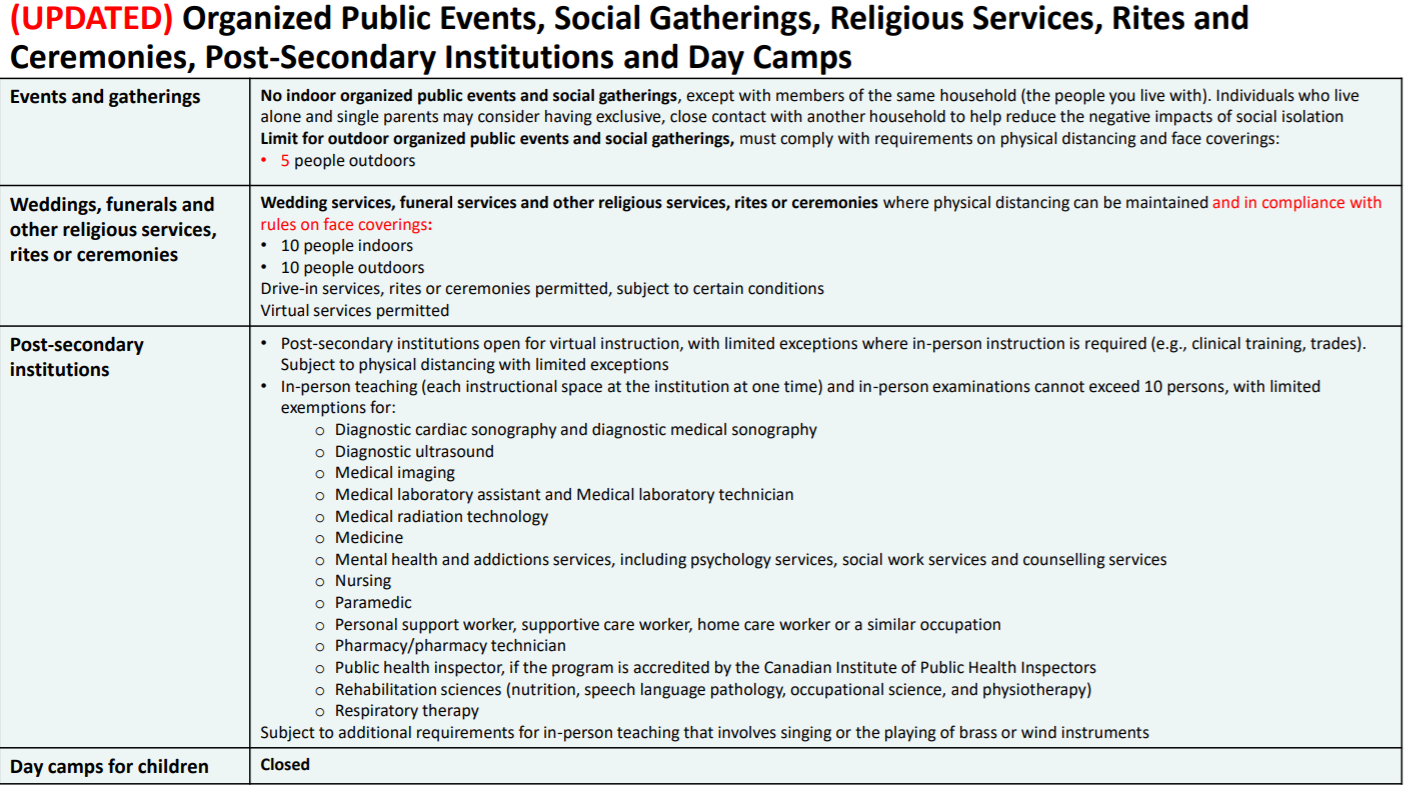
Schools and Child Care
- Schools in ‘Grey-Zones‘ will remain closed until February 10. These include Windsor, Toronto, Peel, York, and Hamilton.
- The Chief Medical Officer of Health will provide advice and an announcement will be made by January 20 regarding the return to in-person learning in all other Public Health Units.
- Students in Grades 1 through 3 must wear masks in school. Masks required outdoors when physical distancing between students isn’t possible.
- Child care for non-school-aged children remains open.
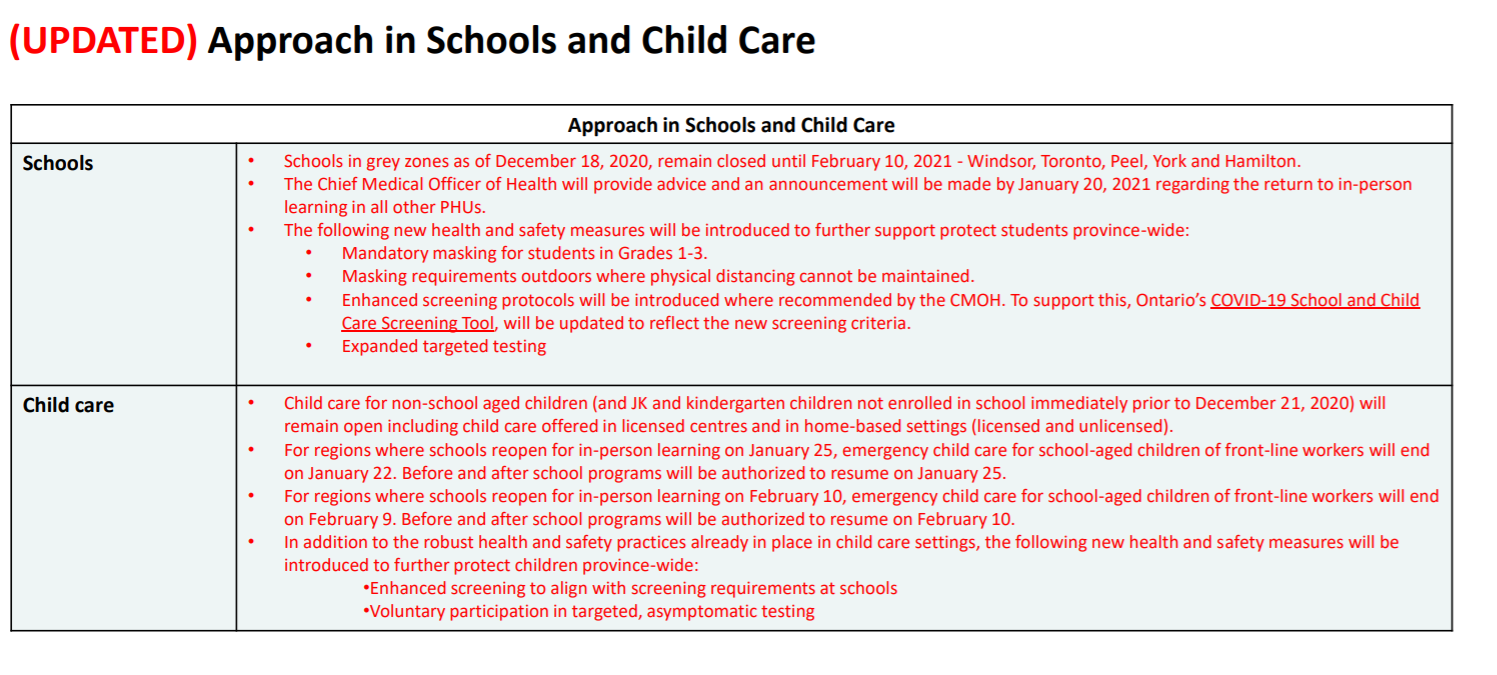
Retail and Workplaces
- Retail stores deemed non-essential and those offering curbside pickup and delivery must limit hours of operation to between 7 a.m. and 8 p.m.
- Food stores, pharmacies, gas stations, convenience stores, and restaurants selling takeout are exempt from the limit on hours.
- Retailers allowed to open for in-person shopping – including supermarkets, convenience stores, box stores that sell groceries, and discount stores must be able to maintain physical distance between people and require face coverings.
- Retailers limited to curbside pickup can only sell items a customer ordered before arriving.
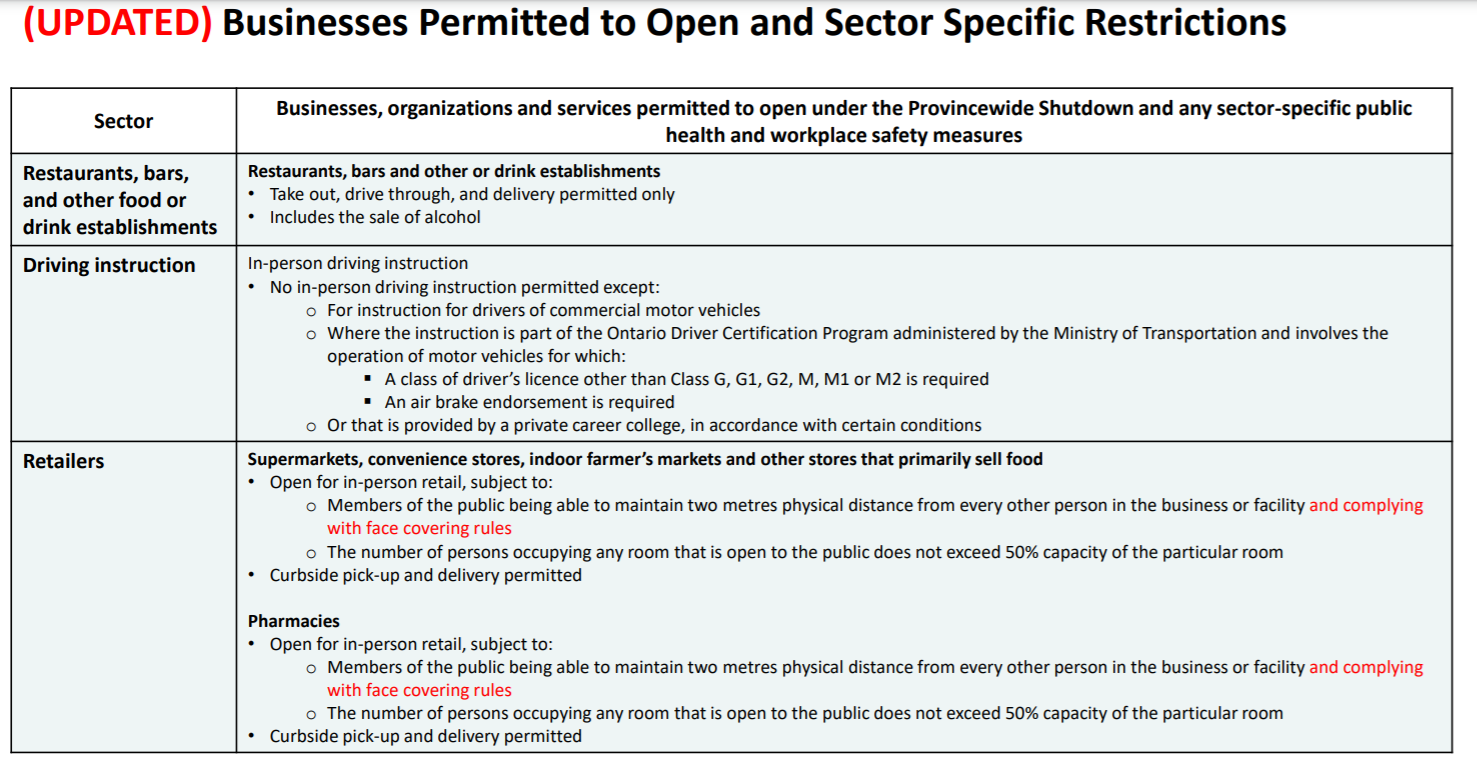
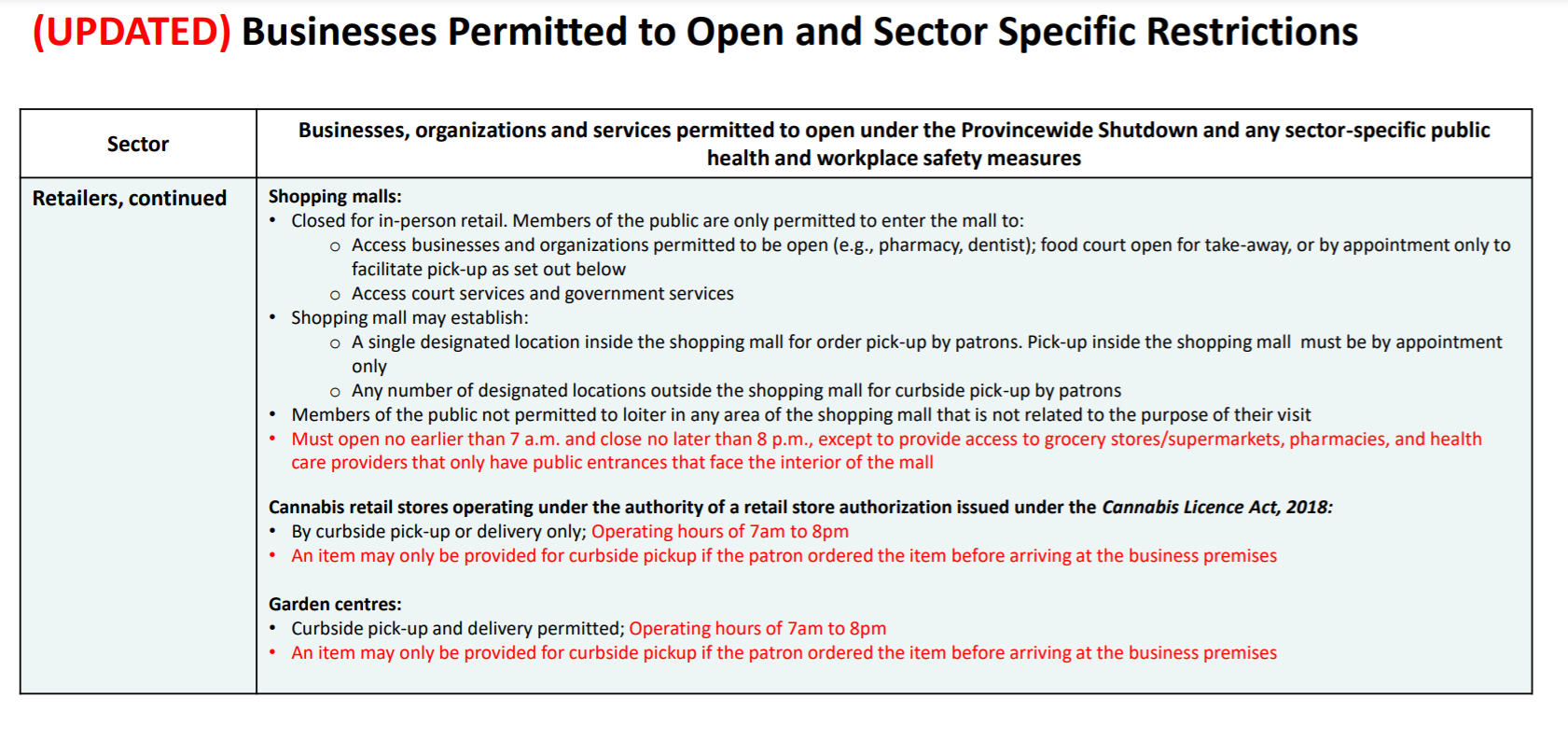
Construction
- Construction deemed non-essential closed, including below-grade construction.
- Land surveying and demolition services permitted.
Sports and Recreation
- Concert venues and theatres closed, including for drive-in or drive-thru events.
- Some outdoor recreation spaces can open with conditions, including parks, baseball diamonds, batting cages, sports fields, skate parks, horse-racing facilities, trails, toboggan hills, ice rinks, and shooting ranges.
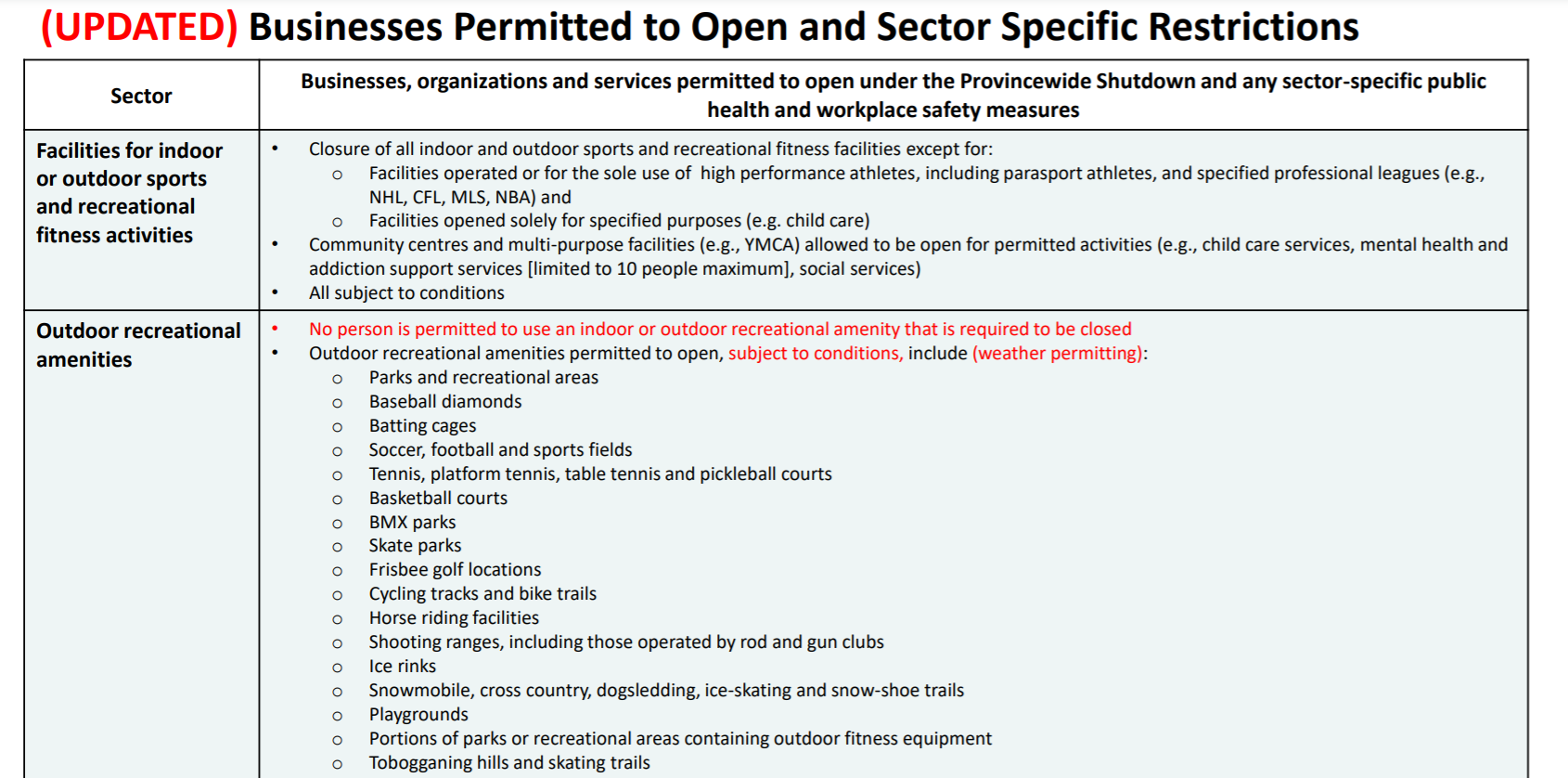
Frequently Asked Questions (FAQ)
What is an essential item?
The Government of Ontario cannot determine what is essential for every person in this province, each with their own unique circumstances and regional considerations. Legally defining what is essential risks cutting people off from goods that may legitimately be necessary for their health, well-being, and safety.
What is an essential trip?
The Government of Ontario cannot determine what is essential for every person in this province, each with their own unique circumstances and regional considerations. That said, we have provided broad categories that people should consider before leaving their home: food, health-care services, including medication, exercise, or work, where someone’s job cannot be done at home.
What is essential work?
The stay-at-home order does not define what work or jobs are essential. Rather, it now mandates that anyone who can work from home must now do so. For example, someone working in retail obviously can’t do their job from home and would be permitted to go to work.
Why hasn’t the province defined who can or should work from home?
The Government of Ontario cannot review tens of millions of job descriptions to determine who can work from home. As such, we are relying on the best judgment and common sense of employers to determine who can do so. If an employee believes they should be working from home, they can contact the Ministry of Labour to file a health and safety complaint.
Why can people still gather in groups of five outdoors?
The outdoor gathering limit of five is in recognition of the fact that some people live alone and may require the company or support of others for their mental and physical well-being. Anyone gathering outside is expected to adhere to physical distancing measures and are now strongly urged to wear a mask.
Can people leave home to exercise? Can I go to my local playground or basketball court?
Yes, exercise is considered an essential reason for leaving your home. What that means will be unique to each individual Ontarian: some may wish to go for a walk around the block, while others may wish to go to a local basketball court with their household to shoot some hoops.
We recommend that Ontarians consult their local public health unit or municipality to understand what recreational amenities are open in their community.
Can someone living alone still join up with another household?
Yes, they can exclusively join one other household. This is to support their mental health and well-being, as well as to ensure those requiring support continue to have access to essential caregivers.
Is there a time limit for how long people can leave their homes?
No. That said, we’re asking Ontarians to use their best judgment when leaving their home for essential reasons. They should limit the number of stores they go to and spend as little time outside of their home as possible.
Is there a limit on the number of times someone can leave their home in a day?
No. That said, we’re asking Ontarians to use their best judgment when leaving their home for essential reasons. They should limit the number of stores they go to and spend as little time outside of their home as possible.
Can people travel to their cottages or secondary residences?
Right now, we are asking people to stay home and only leave their homes for essential purposes, which could include emergency maintenance of a secondary residence. In the spirit of the stay-at-home order, at this time we are not recommending intra-provincial travel.










